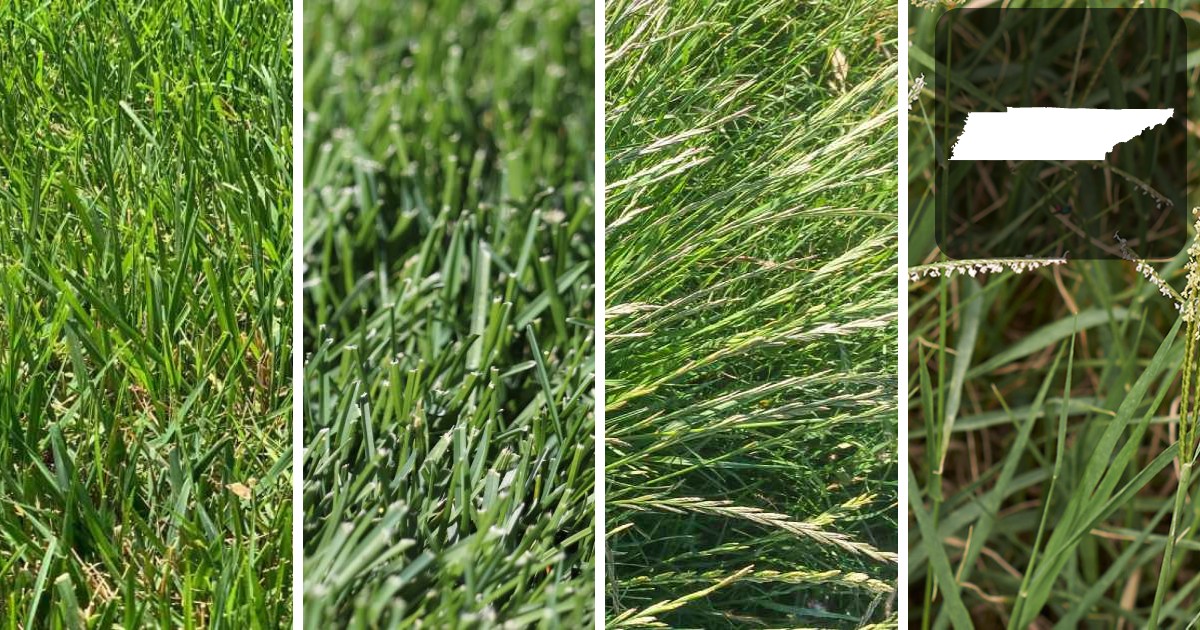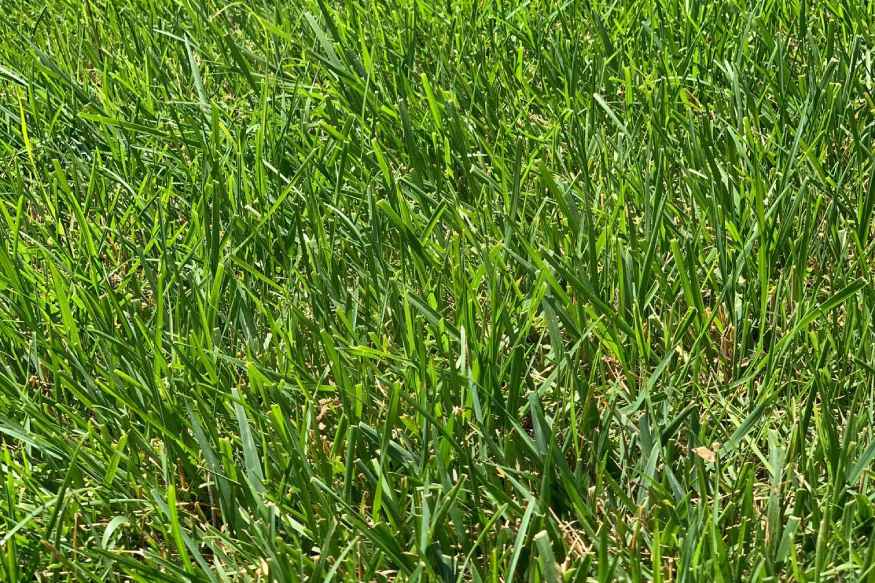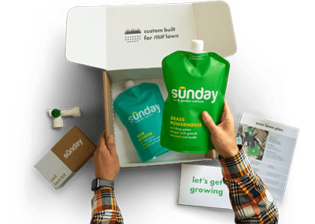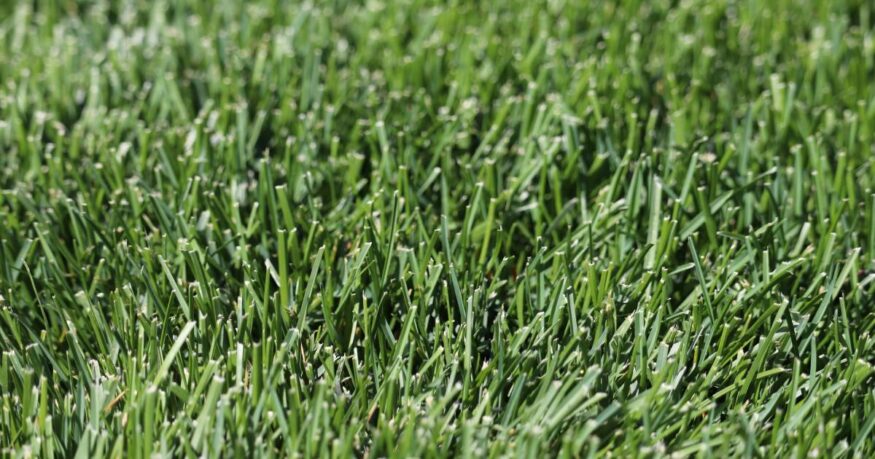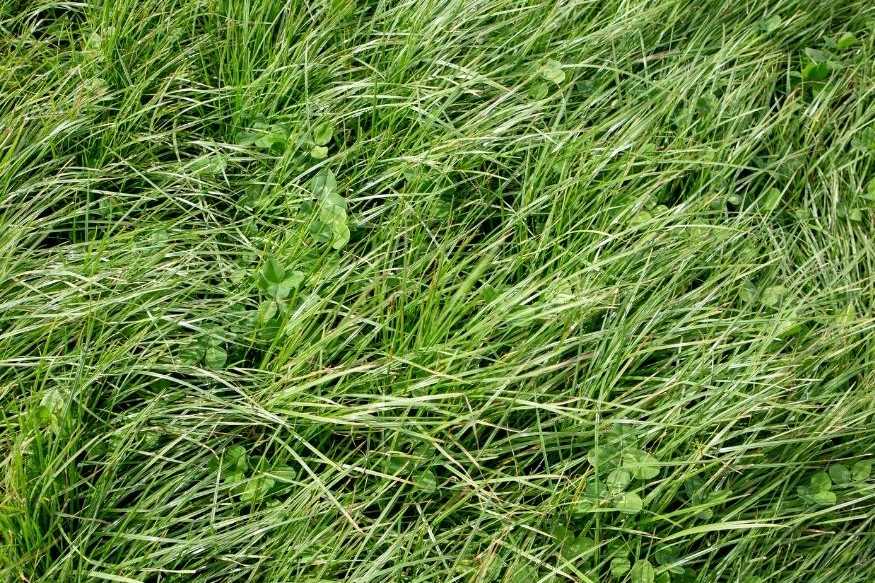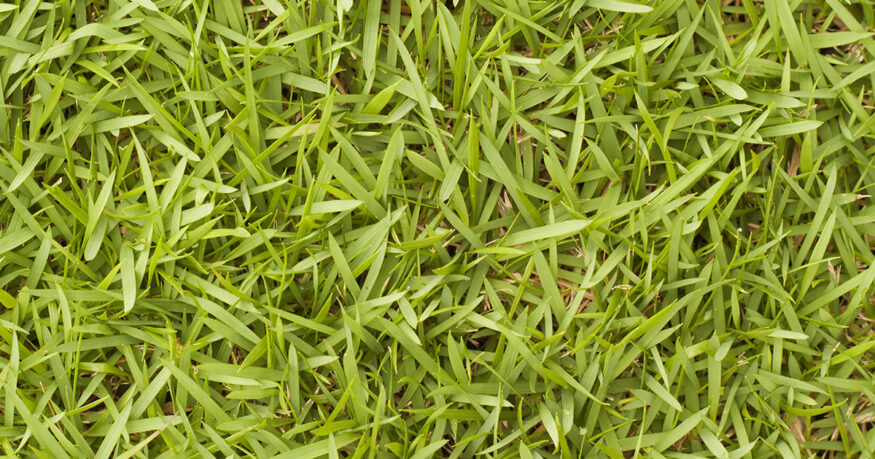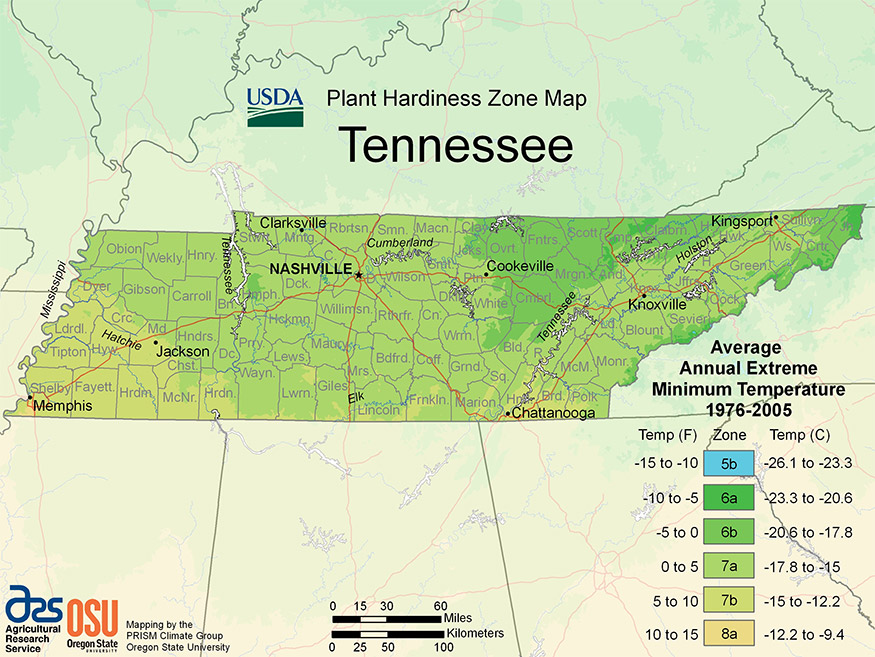Growing a beautiful lawn in Tennessee can be a challenge, but the right choice of grass seed can make all the difference. Although Tall Fescue is commonly used and well-suited to Tennessee’s climate, it’s not the only option available.
In this article, we’ll explore some of the best grass seeds for Tennessee, along with some of the difficulties faced by homeowners in the region. From sweltering summers to frigid winters, Tennessee’s climate can be tough on lawns. Nevertheless, selecting the appropriate grass seed can enable you to establish a lush and robust lawn that will leave your neighbors envious.
Whether you’re starting from scratch or rejuvenating an existing lawn, continue reading to discover the optimal grass seed for your Tennessee yard.
Tall Fescue
| Also Known As | Lolium arundinaceum (formerly Festuca arundinacea) |
| Type of Grass | Cool season perennial |
| Optimal Zones | Northern through transition zones |
| Root Structure | Deep |
| Winter hardiness | Excellent |
| Shade tolerance | High |
| Water Requirements | Medium to High |
| Drought Tolerance | Excellent |
| Self Repair Capacity | Limited |
| Overall Maintenance Requirements | Low |
Why Tall Fescue is a good choice for Tennesee Lawns
If you’re looking for a grass that can stand up to the varied and sometimes challenging conditions of Tennessee’s climate, tall fescue might be the perfect choice for your lawn. Not only is it durable and persistent, making it ideal for sports fields, playgrounds, and parks, but new and improved varieties also offer a finer texture, higher tiller density, and darker green color than earlier, coarser varieties. Although it’s not recommended for mixing with other turfgrass species due to its tendency to form coarse-textured clumps, tall fescue is a good choice for open, sunny areas and is moderately shade tolerant.
Tall fescue is particularly well-suited to Tennessee’s climate, being the most heat and drought-tolerant of the cool-season turfgrasses. This resilience is due to its ability to develop a deep root system that can withstand periods of drought. While it may be less well-suited to heavily shaded areas than some other grasses, such as fine fescues, it is more tolerant of shade than Kentucky bluegrass or perennial ryegrass.
Tall Fescue is a great choice for cool and humid regions, like Tennessee, and it’s particularly adept at tolerating drought conditions, disease, and traffic from walking and playing. Ultimately, if you’re looking for a lawn that can stand up to Tennessee’s varied weather conditions while remaining low-maintenance and attractive, tall fescue is a smart choice.
Looking for the best grass seed for your region?
Our smart lawn plans are designed to work perfectly with your local soil and climate conditions, without any of the toxic stuff.
Use the code EHG20 for an instant $20 discount!
- Personalized lawn care: Custom lawn plans based on soil analysis, climate data, and your specific lawn needs.
- Convenience with a conscience: Products that are not only easy to use but also safe for you, your pets, and the planet.
- Science-backed formulas: Bio-based formulas contain effective, natural ingredients like seaweed, molasses, and iron.
- Expert support: Get one-on-one guidance from a real person and rest easy with Sunday's satisfaction guarantee.
Kentucky Bluegrass
| Also Known As | Poa pratensis L. |
| Type of Grass | Cool season perennial |
| Optimal Zones | Northern cool season zone, transition zones |
| Root Structure | Shallow |
| Winter hardiness | Excellent |
| Shade tolerance | Poor to Good |
| Water Requirements | High |
| Drought Tolerance | Poor |
| Self Repair Capacity | Excellent |
| Overall Maintenance Requirements | High |
Why Kentucky Bluegrass Grows Well in Tennessee
Kentucky Bluegrass is a cool season grass that can handle some heat, making it an excellent choice for homeowners in Tennessee who want a lush and attractive lawn.
Kentucky bluegrass is a cool-season grass that is best adapted for the fall and winter months, providing homeowners with a lush green lawn for the majority of the year. While it requires regular watering to maintain its beauty, it is well worth the effort. However, if summers are too hot, mixing in heat-tolerant grasses may be necessary to keep the lawn healthy. Once established, this self-spreading grass forms a dense turf with boat-shaped leaves of dark green color.
This persistent and good-looking species is popular for home lawns, institutional grounds, parks, and athletic fields, thanks to its medium-to-fine leaf texture and medium-to-dark green color when properly fertilized. It produces extensive underground stems, known as rhizomes, which make for excellent sod-forming characteristics and superior recuperative potential when compared to most other cool-season turfgrasses. Kentucky bluegrass is cold tolerant, wear tolerant, and moderately heat and drought tolerant.
It prefers full sun, but can tolerate some shade, and is well-suited to high traffic areas due to its ability to recover quickly from injury. While it can be slower to germinate than some other varieties, once established, it spreads easily to fill in bare patches.
Although it has a low tolerance for heat and drought due to its shallow roots, it can adapt well to high foot traffic and recovers quickly from injury.
Perennial Ryegrass
| Also Known As | Lolium perenne L. |
| Type of Grass | Cool season perennial |
| Optimal Zones | Mild northern zones |
| Root Structure | Deep |
| Winter hardiness | Good to excellent |
| Shade tolerance | Moderate |
| Water Requirements | High |
| Drought Tolerance | Good |
| Self Repair Capacity | Excellent wear tolerance |
| Overall Maintenance Requirements | Moderate to high |
Why Perennial Ryegrass seed is a good choice for Tennessee
If you’re looking for a persistent and good-looking grass that can handle heavy foot traffic, perennial ryegrass might be just what you need for your Tennessee lawn. With its fine to medium texture and dark-green color, it’s a popular choice for home lawns, parks, grounds, golf courses, and athletic fields. It germinates quickly and establishes rapidly, making it ideal for overseeding thin or damaged turf.
Perennial ryegrass has a bunch-type growth habit and is wear and heat tolerant, though it is only moderately shade and drought tolerant. It can withstand low temperatures but is susceptible to ice damage. This species performs best on moderately to highly fertile, well-drained soils.
While perennial ryegrass is a great option for quick color and establishing soil stability, its shallow roots prevent it from effectively fighting against heat and drought, making it best-suited to cooler temperatures.
It’s important to maintain the same mowing heights and seasons as Kentucky bluegrass for optimal results. However, due to its aggressive nature, it’s generally not used in amounts over 20 percent in a mixture with other turfgrasses. With its rapid germination and seedling growth, perennial ryegrass is a short-term solution that can also be a permanent solution for property owners seeking a good-looking and durable grass for their Tennessee lawn.
Looking for the best grass seed for your region?
Our smart lawn plans are designed to work perfectly with your local soil and climate conditions, without any of the toxic stuff.
Use the code EHG20 for an instant $20 discount!
- Personalized lawn care: Custom lawn plans based on soil analysis, climate data, and your specific lawn needs.
- Convenience with a conscience: Products that are not only easy to use but also safe for you, your pets, and the planet.
- Science-backed formulas: Bio-based formulas contain effective, natural ingredients like seaweed, molasses, and iron.
- Expert support: Get one-on-one guidance from a real person and rest easy with Sunday's satisfaction guarantee.
Bermudagrass
| Also Known As | Bermuda grass, wiregrass; Cynodon dactylon L. |
| Type of Grass | Warm season perennial |
| Optimal Zones | Southern region |
| Root Structure | Deep |
| Winter hardiness | Poor |
| Heat tolerance | Excellent |
| Shade tolerance | Poor |
| Water Requirements | High |
| Drought Tolerance | High |
| Self Repair Capacity | Excellent |
| Overall Maintenance Requirements | Moderate to High |
Why Bermudagrass Grows Well in Tennessee
If you’re looking for a grass species that’s well-suited to the climate and growing conditions of southern Tennessee, Bermudagrass is a great choice. This grass spreads quickly by aboveground runners and belowground runners, making it ideal for establishing lawns quickly, but it can become a nuisance if it invades flower beds and gardens.
Bermudagrass is primarily used for sports fields and golf courses, but has become increasingly popular for lawns in Tennessee. It’s hardy, resistant to heavy traffic, and drought-resistant, making it a good choice for homeowners who want a grass that can stand up to the rigors of daily use. However, it requires frequent fertilization and irrigation, and because it’s one of the fastest-growing warm-season grasses, it usually needs to be mowed at least twice per week during peak growing season.
Bermudagrass is a warm-season grass that thrives in full sun, requiring plenty of direct sunlight to perform at its best. It’s available in a variety of seeded and vegetative varieties that are denser and finer textured than older, common varieties, and cold-tolerant varieties are available that can withstand lower winter temperatures. Planting options include seed, sod, plugs, and sprigs.
While Bermudagrass is a hardy and attractive species, it is not immune to pests and diseases. Common pests include armyworms, fire ants, grub worms, mole crickets, and billbugs, while common lawn diseases include leaf spot, dollar spot, and rust.
To keep your Bermudagrass lawn looking its best, it’s important to be vigilant about pest and disease management, and to maintain a regular fertilization and irrigation schedule.
Tennessee’s Climate and Growing Challenges for Lawns
Tennessee’s climate can be challenging for lawn care, as the state experiences hot, humid summers and mild winters. The state has a humid subtropical climate, with varying weather conditions depending on the location. Summers are hot and humid, with temperatures ranging from 80 to 90 degrees Fahrenheit, while winters are mild, with temperatures averaging in the mid-40s to mid-50s.
Soil Conditions
The soil conditions in Tennessee can also pose a challenge for lawn care. The state has a variety of soil types, including loamy, sandy, and clay soils. It’s important to choose a grass species that is well-suited to your soil type, as different grasses have different requirements for water, nutrients, and drainage.
Pests and Diseases
Tennessee also experiences a range of challenges for growing lawns, including drought, disease, and pests. Some common pests in the area include armyworms, fire ants, grub worms, mole crickets, and billbugs, while common lawn diseases include leaf spot, dollar spot, and rust. It’s important to be vigilant about pest and disease management, as well as to maintain a regular fertilization and irrigation schedule, to keep your lawn looking its best.
Looking for the best grass seed for your region?
Our smart lawn plans are designed to work perfectly with your local soil and climate conditions, without any of the toxic stuff.
Use the code EHG20 for an instant $20 discount!
- Personalized lawn care: Custom lawn plans based on soil analysis, climate data, and your specific lawn needs.
- Convenience with a conscience: Products that are not only easy to use but also safe for you, your pets, and the planet.
- Science-backed formulas: Bio-based formulas contain effective, natural ingredients like seaweed, molasses, and iron.
- Expert support: Get one-on-one guidance from a real person and rest easy with Sunday's satisfaction guarantee.
